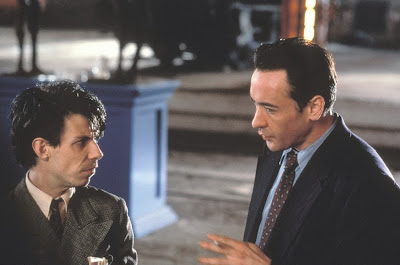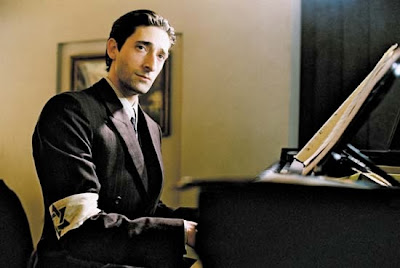The year has indeed been kind to actors trying their hand at film directing. Consider first Bill Paxton’s undertaking earlier this year with "Frailty," and then think of the latest of these efforts, Denzel Washington's "Antwone Fisher." Both labors of love for men who have seemed to possess a curiosity beyond the motion of the foreground, they have proven to be quick learners with each passing scene. Paxton’s first outing may be the best film of the year, but Washington’s, nonetheless effective, doesn’t quite make that mark. Here is a film that shows promise more than a power of payoff.
Friday, December 27, 2002
Evelyn / *** (2002)
What a sweet, gentle and feisty movie "Evelyn" is. And what an admirable little person its title heroine turns out to be, a redheaded Irish girl who isn't afraid to speak her mind and voice her concerns even if it means certain punishment from her overly-strict superiors. At the opening of the movie, which is based on true-life events in the early 1950s, the vivacious Evelyn Doyle (Sophie Vavasseur) and her two brothers are sent off into Irish orphanages following the abandonment of their flaky mother, their father, Desmond Doyle (Pierce Brosnan), seeing no need for the government to resort to such actions because of his own availability to raise them. Lifestyle and capability aside, however, he simply can't avoid the harsh reality of Irish law: that children are forbidden to live with just their fathers unless consent is given from the mother as well, a requirement that is challenged by the fact that dear old mom has seemingly disappeared from radar.
Max / **** (2002)
The moviegoer has come to expect almost anything from the filmmaker in these recent times, but it is doubtful one could have ever anticipated a movie that tackles the maniacal persona of Adolf Hitler on such an objective and fearless level. In Meyno Meyjes's "Max," which is less about the Max Rothman character than it is about the future German dictator, the impression is given that Hitler was not always the demonic figure we consider him to have been, but at one time simply an eccentric human being who was pushed beyond the borders of sanity and never able to find his way back. Historically, the movie probably follows accurately with what has always been said about him prior to World War II, but will any of that matter to the viewer? To discuss him in any context other than being evil is still quite risky; this is, after all, the most despicable living creation that existed during the 20th century.
My Big Fat Greek Wedding / **** (2002)
"My Big Fat Greek Wedding" is what you refer to as one of the great "grinning comedies" of our time, in which every scene and every character, no matter how silly or odd, leaves the viewer smiling from ear-to-ear in constant and utter delight. No doubt you've heard about the film by now, anyway; drawing audiences into the theaters week after week with few major attendance declines, the vehicle survives at the box office even most high profile releases fall by the wayside. It has even been said that movie might be a Best Picture contender for next year's Academy Awards. And if it is, what a great pleasure that would be! How often, after all, can you recall a PG-rated romance comedy that had enough exuberant charm and spirit to actually deserve a crack at the top prize?
The Pianist / **** (2002)
If Roman Polanski were not the same man who directed "Chinatown" and "Rosemary's Baby," he might never have been equipped enough to tell a story as difficult and poignant as that of "The Pianist." It's easy to pretend that a narrative of this emotional caliber simply requires a filmmaker with a distinctive knowledge of cinema, but the demand goes far beyond that; compassion and association are prerequisites as well. Not surprisingly, Polanski's greatest films explore parallel subjects—victimization, claustrophobia, and an underlying dogged hope that keeps the human spirit elevated to survival—and having mastered the themes before most modern directors even knew how to use a camera, he sort of becomes fated into the position, as if every significant product in his career has merely been a prelude to him forging this one. The fact that the story itself correlates with most of what went on in his own early life doesn't hurt matters, either.
Wednesday, December 18, 2002
The Lord of the Rings: The Two Towers / **** (2002)
The opportunity to see history being made on the movie screen comes but once or twice a generation, and right here, right now, one of those rare events is happening with Peter Jackson's adaptation of the "Lord of the Rings" trilogy. Last winter saw the audience on its first rich excursion into Tolkien's Middle-Earth with "The Fellowship of the Ring," and now comes "The Two Towers," the second film in the series, which picks up exactly where its predecessor left off, diving headfirst into the material as if not a moment has gone by since we were last stranded in the realm of wizards, mortals, elves, dwarfs and hobbits. Much has happened since the adventure was halted 12 months ago—the first endeavor received 13 Academy Award nominations, grossed over half a billion dollars, and was even recently released as an extended cut on DVD—and yet the initial experience remains fresh in the mind, enduring even when other ambitious projects in that time frame have been completely forgotten (the latest "Star Wars," anyone?).
Brotherhood of the Wolf / **** (2002)
The French must know a lot more about cinema than we have ever given them credit for, particularly judging by the most recent products from their soils that have found an audience here across the Atlantic. The new millennium opened to the arrival of the rich and comedic "The Taste of Others," while the delightfully-vivid character study "Amelie" from last year provoked the curious eye almost as much as it exhilarated the viewer's spirit. The secret to the success of these two particular endeavors, and perhaps as it has always been with moviemaking in the country, is about stretching the cultural barriers beyond their own, embracing both French fundamentals as well as those of other civilizations to package an effort both rich and diverse in its techniques and legacies. It can even be argued that French movies aren't entirely French anymore, but Asian, American, Italian, British, and Indian as well.
Monday, December 2, 2002
Eight Crazy Nights / zero stars (2002)
It must be more than just sheer coincidence that the worst animated film since "Cool World" is being released alongside one of the most brilliant of the recent past. Adam Sandler's aptly-titled "Eight Crazy Nights" finds itself being unleashed on reputable theater screens during the same weekend as Disney's highly-anticipated "Treasure Planet," the first traditional feature cartoon since "Titan A.E." to rise above the mold and pull the viewers into an experience both adventurous and exhilarating. Lumping these two products together, if you think about it, is an ideal marketing campaign—if the moviegoers are going out of their way to see a cartoon during Thanksgiving, do they really care enough to make a choice between two major openings? Of course not. And given the fact that Sandler's name—not to mention the holiday theme—is attached to this one, that's probably exactly what Columbia Pictures is depending on.
The Santa Clause 2 / *** (2002)
At the beginning of "The Santa Clause 2," a plane with tracking systems begins picking up signs of disturbance towards the north pole, the lyrics of "Santa Claus is Coming to Town" riding the waves that the aircraft's crew are closely monitoring. Meanwhile, deep beneath the thick sheets of ice, Santa himself and all his little helpers rush against the clock to silence the source of this little rumpus, hopefully before any outside influences get too close to the source and discover their well-hidden village. It wouldn't be a terrible thing, we gather, if all the little workshops and townhouses for elves and little toy factory workers were discovered, but we can imagine the frustration of good ol' St. Nick—it's so hard, after all, to keep an effective assembly line going when you've got unwanted visitors threatening to disrupt your intricate pattern all the time.
Solaris / *1/2 (2002)
Steven Soderbergh's "Solaris" plays like a blender working overtime on the puree dial, mix-mashing character conflicts, fated love stories, scientific mysteries and visual wonders so savagely that we're never given the opportunity to see the result materialize. It's not hard to accept that a lot of time and effort went into putting a film of this extreme detail together (note that James Cameron is one of the primary producers), but it's considerably more difficult to assume why anyone even bothered, especially since the outcome fails to barely come off as anything resembling a finished product. The movie is more like a series of vague outlines than a completed opus, touching base with lots of bright ideas without actually pulling through with a full treatment.
Treasure Planet / ***1/2 (2002)
If Robert Louis Stevenson had lived long enough to see his creative flair dispatched into the mighty cosmos, he would have undoubtedly been overjoyed by any result. But in the latest Disney animated feature, the ambitious and exciting "Treasure Planet," the compelling scope of his most unforgettable written work is set against one of the most bright and rousing canvases seen in standard feature animation since "Titan A.E.", a look that doesn't simply flood the screen with its color and energy, but pulls the viewer into the experience. This isn't a product in the grand tradition of the best Disney cartoons, mind you, because it follows no tradition but its own. Like last year's "Atlantis," only on a much wider scale, the movie is in complete awe of itself, devised from no direct pattern or formula, and yet crafted with the most essential pleasures in mind.
Subscribe to:
Posts (Atom)











